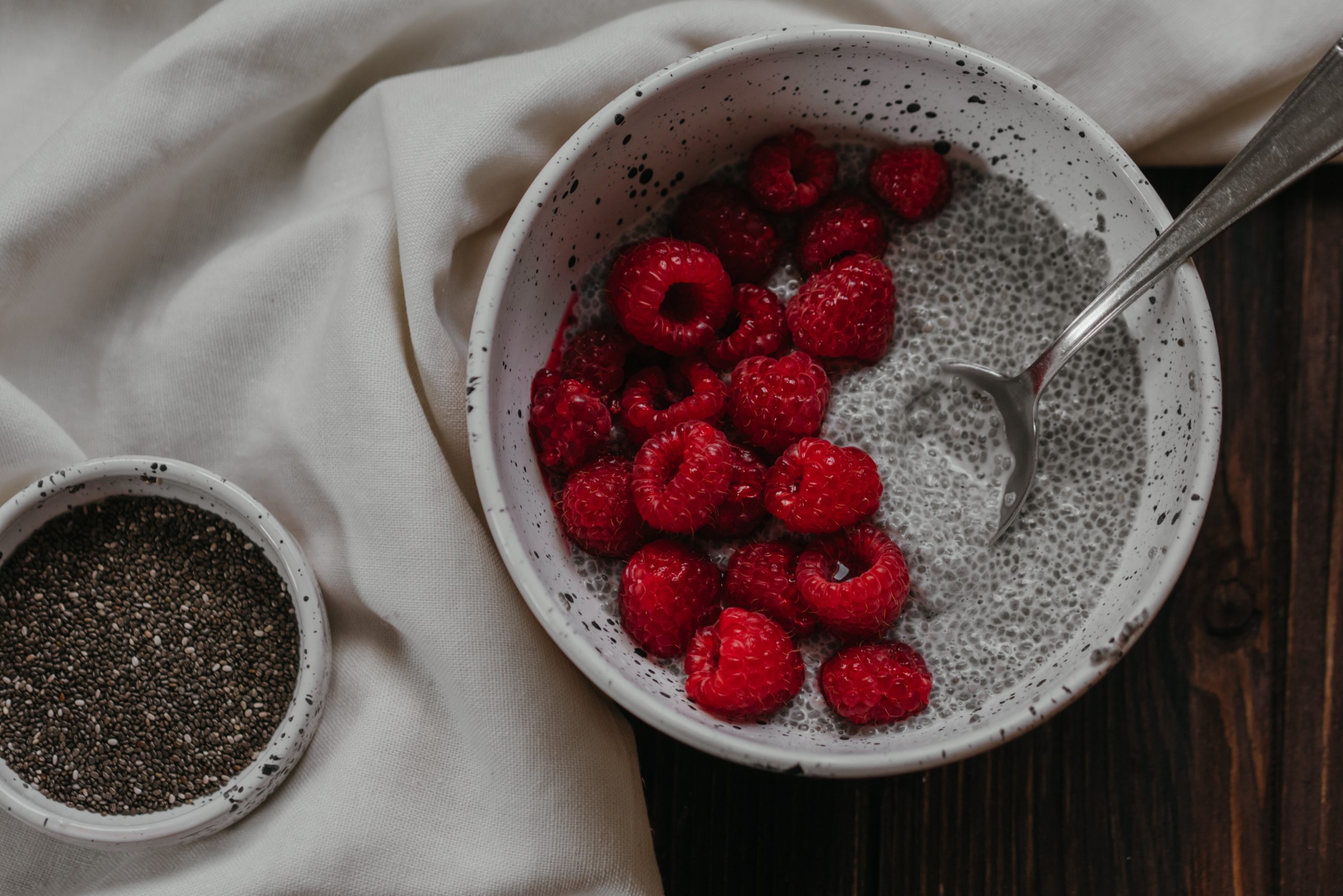Carrots have been known for centuries – scientists claim that the first carrots originated in Afghanistan, where they were of a variety of colours. Carrots were found as early as the 3rd millennium BC in the drawings of the temple at Luxor. And in the place where Pharaoh was buried, they found papers that wrote about medical treatments involving carrots. In ancient Greece this vegetable was called a “love-bearers”, Greeks believed that they helped one to be kind and loving.
Hippocrates once claimed that women should eat a lot of carrots to avoid getting pregnant. We do not recommend this non-science backed method of contraception however we can recommend the vegetable for many other scientifically-proven benefits.
Carrots – Nutrition facts

Carrots have a low energy value, a small amount of protein, are not high in carbohydrates or sugar but are still sweet. Carrots have a low glycemic index which is good for your glucose levels.
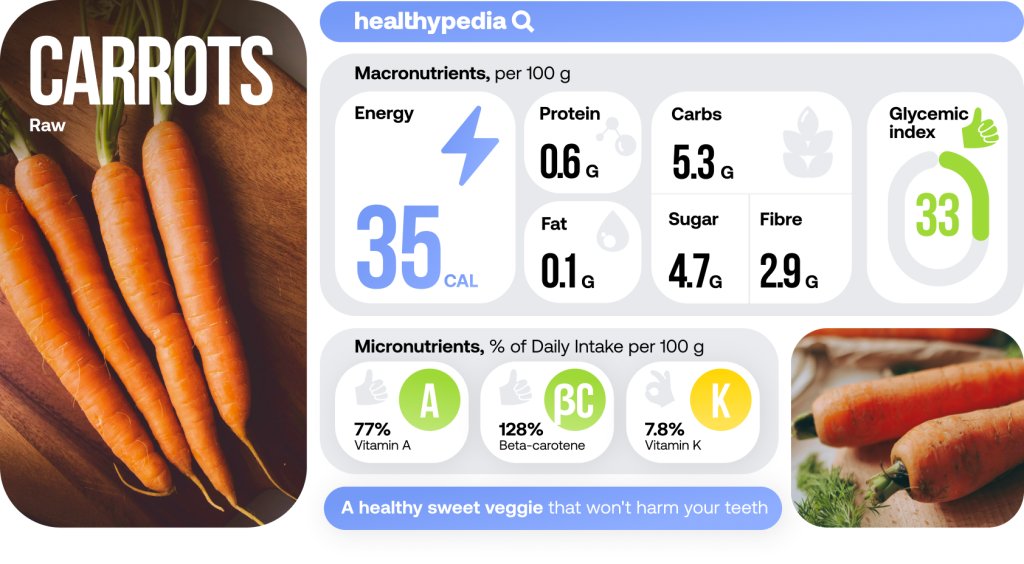
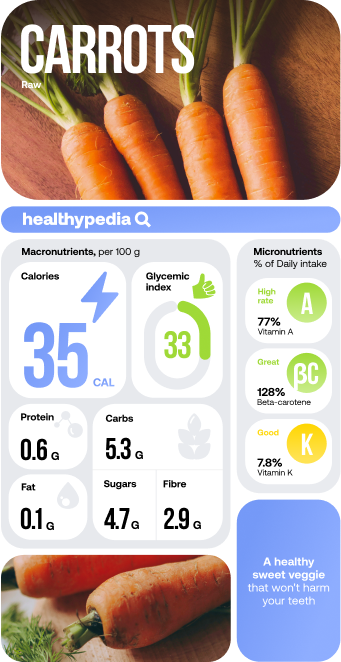
Carrots: The Positives

Carrots are a nutritious and delicious vegetable that can provide a variety of health benefits.
1Helps your eyesight
Carrots are a good source of Vitamin A. Vitamin A is important for maintaining healthy vision. It helps the retina, a light-sensitive layer of cells at the back of the eye, function properly. Vitamin A is also necessary for the production of a protein called rhodopsin, which is found in the retina and allows the eye to adjust to low-light conditions. Carrots are also rich in beta-carotene and lutein, which are antioxidants that can help protect the eyes from free radical damage. Eating a diet rich in fruits and vegetables like carrots, which are high in these antioxidants, can help support healthy vision.
2Strengthen your immunity
Carrots have antiseptic and antibacterial abilities, which help to improve the functioning of the body’s immune system. In addition, carrots contain Vitamin C, which stimulates the activity of white blood cells and is one of the most important elements for maintaining a strong immune system.
3Prevents the development of cancers
The beta-carotene found in carrots may reduce the risk of certain forms of cancer, particularly lung cancer. Separate studies show that eating fibre-rich vegetables such as carrots reduces the chance of developing colon cancer by 24%. The study shows that women who eat raw carrots have 21% less risk to develop breast cancer than women who do not consume this vegetable.
 Source: National Library of Medicine
Source: National Library of Medicine 4Maintains a healthy gut
The fibre in carrots acts as a natural vacuum cleaner in the gastrointestinal tract, picking up debris as it passes through the body. This can help to prevent constipation and promote regular bowel movements. Carrots also help keep intestinal cells healthy, which helps to reduce the risk of disease and improve overall health.
5Increase bone strength
Carrots contain vitamin K2. It is responsible for bone metabolism and prevents calcium leaching. As a result, the risk of osteoporosis is reduced. This is especially important for elderly women after menopause.
6Cleanse the body
Carrots and their juice have a choleretic effect which means they can stimulate the production of bile by the liver and can help support the health of the liver, kidneys, and gallbladder. The fibre content of carrots can also help to cleanse the digestive system and promote the elimination of toxins from the body. In addition, the antioxidants in carrots can help protect these organs from damage caused by free radicals. Overall, consuming carrots and their juice as part of a healthy diet can support the health of the liver, kidneys, and gallbladder.
7Promotes healthy skin
Carrots are a source of vitamin C (7% of daily intake in every 100 grams of Carrots) which is essential for collagen production. Collagen is a protein that helps keep skin supple and healthy. Vitamin C also has antioxidant properties that help protect the skin from damage caused by free radicals. A diet rich in fruits and vegetables, such as carrots, can help maintain healthy, glowing skin. In addition, the high water content of carrots (88%) helps to hydrate the skin and keep it smooth and plump. In general, eating carrots as part of a healthy diet can help promote healthy and glowing skin.
8Make your teeth and gums healthier
Carrots are an amazing natural sweet that not only does not ruin your teeth but rather helps keep them clean. You can chew on a carrot after a meal, this natural abrasive will gently clean your teeth. Biting carrots also stimulates your gums and saliva which is good for your mouth and helps fight bacteria.
9Reduce stress levels
One of the beneficial properties of carrots is the ability to calm the nervous system, preventing its exhaustion. Carrots are a good source of tryptophan, which is an amino acid that is converted into serotonin in the brain and must be provided with food, as our bodies cannot synthesise it on their own. Serotonin is a neurotransmitter that plays a role in mood and can help to promote feelings of calmness and relaxation. Regular consumption of root vegetables such as carrots reduces nervous tension and increases stress resistance.
10Has a low price tag and the cheapest way to get enough Vitamin A
Carrots are not only a healthy and simple product. Another advantage is its price. 1kg of carrots will cost you just £0.45 ($0.52).
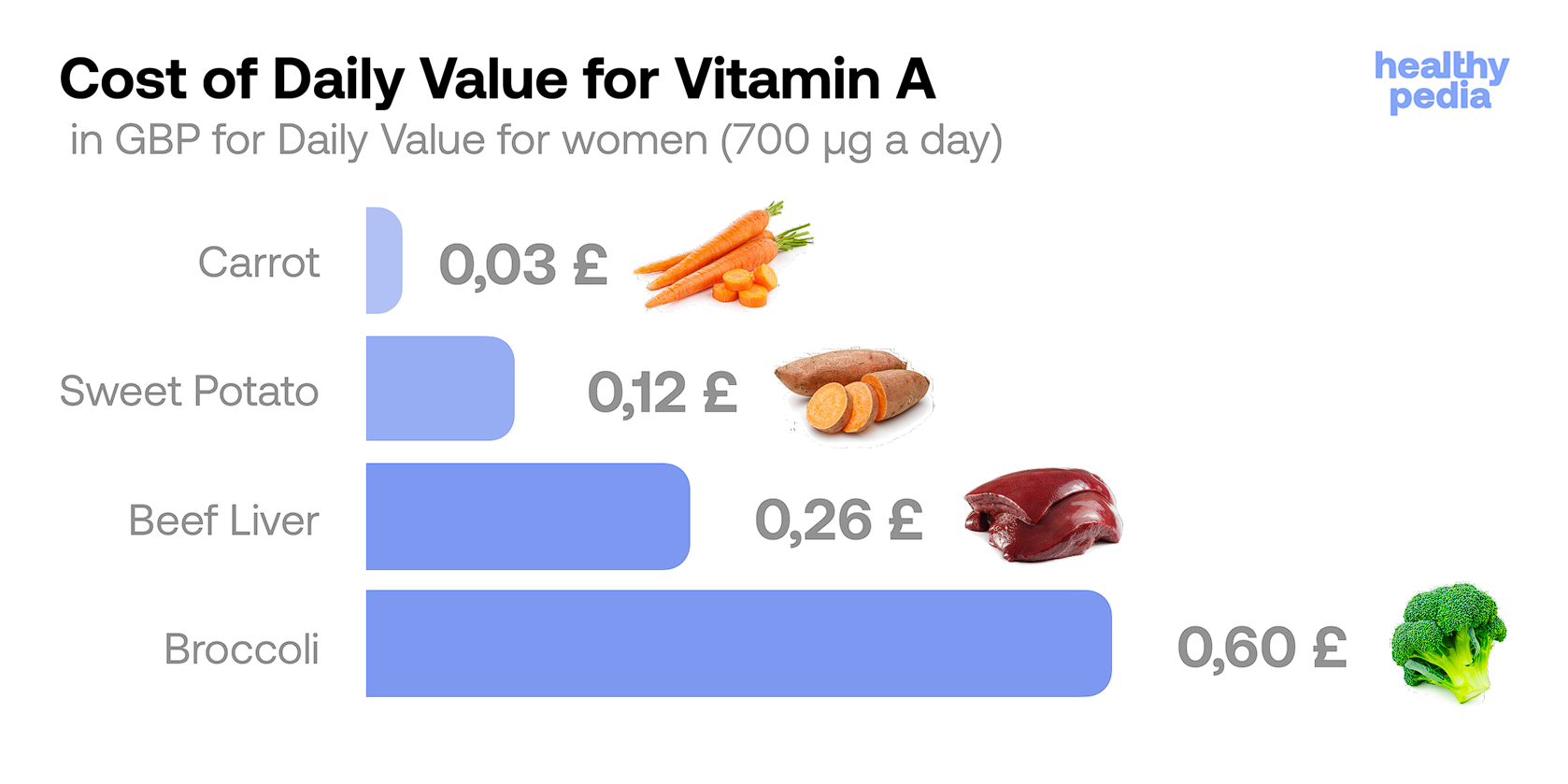 Source: Healthypedia
Source: Healthypedia Carrots: The Downsides

Let’s explore potential negatives to carrots.
Excessive consumption of carrots can provoke indigestion and intestinal disorders. This root crop would better not be added to a diet of a person struggling with liver disease as an unhealthy organ cannot absorb carotene. Gastric ulcers and enteritis are also contraindications. In addition, carrots can cause an allergic reaction and should be cautiously consumed by women who breastfeed their children.
Eating large quantities of carrots or other foods rich in beta-carotene can lead to a condition called carotenemia. This is when there is excessive accumulation of beta-carotene in the body, which can cause the skin to turn yellow or orange. Usually, it is not dangerous but it can be a sign that you are eating too many carrots or other foods high in beta-carotene. It is usually reversible and can be treated by reducing your intake of beta-carotene-rich foods. If you are concerned about the yellowing of the skin or whites of the eyes, it is best to talk to your doctor.
While carrots are generally considered to be a healthy and nutritious vegetable, there are some potential drawbacks to eating them. One potential drawback is the possibility of allergic reactions. Some people may be allergic to carrots or other vegetables in the same family, such as celery, parsley, and fennel. Symptoms of a carrot allergy can include skin rash, swelling, difficulty breathing, and anaphylaxis.
One of the drawbacks of carrots is that they can sometimes be difficult to digest, especially if they are eaten raw and in large quantities. However, this is not a common issue and can be easily avoided by cooking carrots or consuming them in moderation.
Fun & curious facts about carrots
-
Carrots are thought to have originated in Afghanistan, where they were first cultivated over 5,000 years ago.
-
Carrots were originally purple or yellow in colour. The orange carrot we know today was developed by Dutch growers in the 16th century.
-
The longest carrot ever recorded was grown by Joe Atherton of the UK, who grew a carrot that measured 19 feet, 10.75 inches (6.07 meters) in length. This record was officially recognized by the Guinness World Records in 2014.
Carrots in the Blue Zones
In many of the Blue Zones, carrots are a common ingredient in the traditional diet. For example, in Okinawa, people commonly eat a type of sweet potato called ‘imo’ that is similar to a carrot in colour and taste. In Sardinia, people often eat a type of flatbread called pane carasau which is made with grated carrots and other vegetables. Overall, people in the Blue Zones incorporate carrots and other vegetables into their diets as part of a healthy, balanced, and plant-based eating pattern.
Carrots. Experiment by our expert
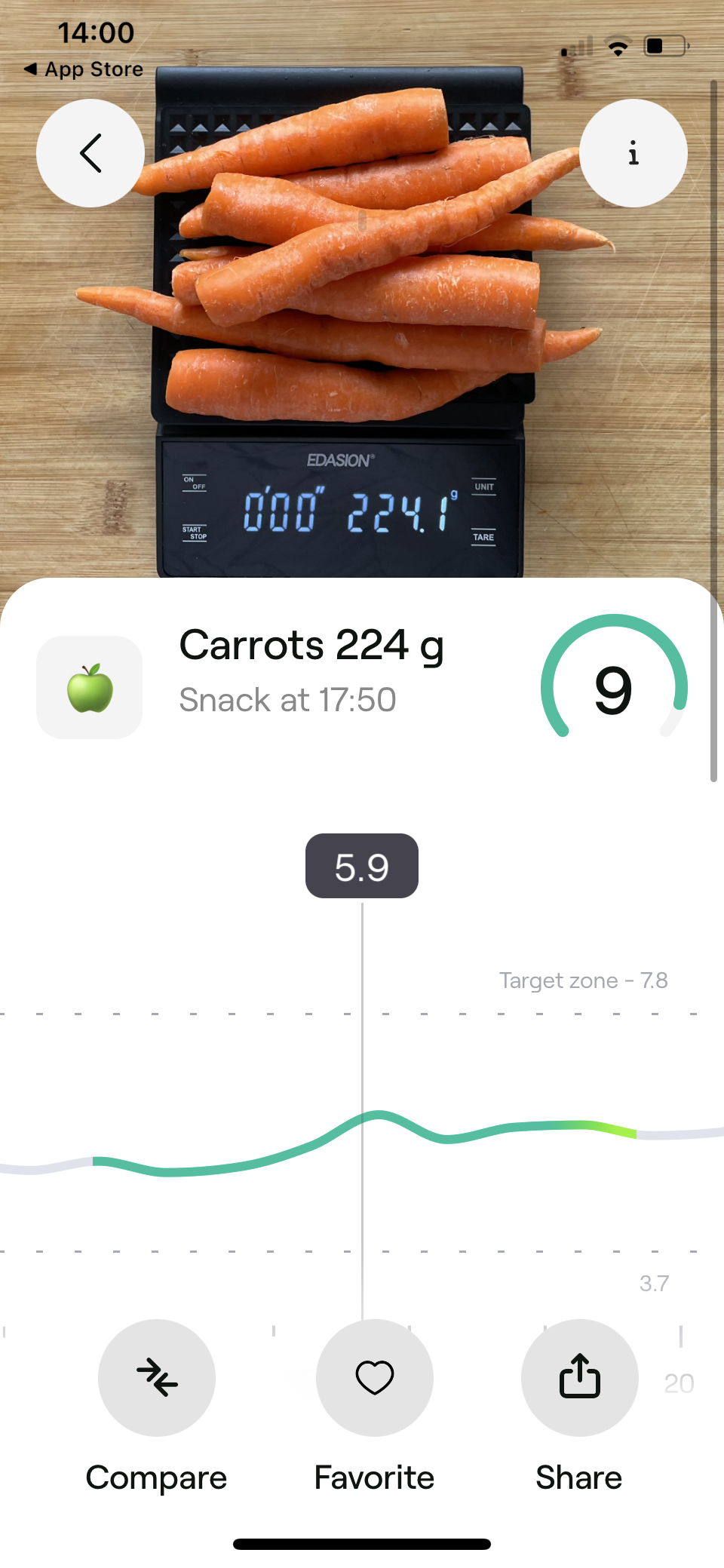 Nutrition
Nutritionscore Blood glucose
trend
In my childhood, my mother made a carrot salad for me and my brothers several times a week. Not carrot cake but salad 🙂. This is because it was inexpensive and quick. However she was also right from a health perspective. I do not eat a lot of carrots now but based on my test results and plenty of benefits I have to seriously think about how to incorporate them into my diet. 9 out of 10. No negative impact. Just positive. I will call my mom for a carrot salad recipe.
Let’s sum carrots up

Carrots will boost your immunity, protect against cancer and make your skin healthier. They will also improve your eyesight and help your teeth and gums. Simple carrots have many benefits and are a very valuable food that can and should be implemented into your diet as a great addition to your plate in the form of an excellent nutritional composition.
Not enough? Here is some more from our colleagues
Here is the Big Progress channel and these guys will tell some interesting facts about what happens to your body if you eat carrots every day!





